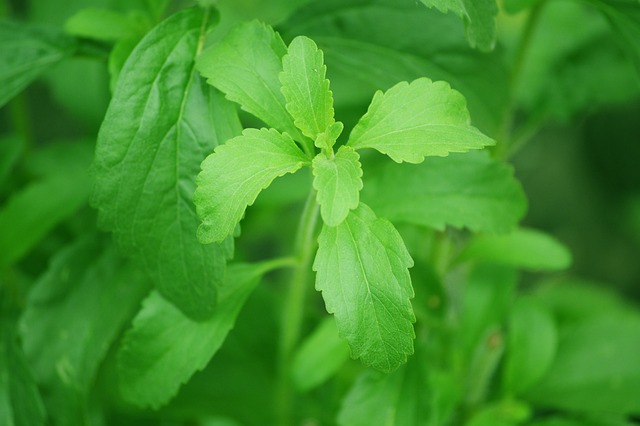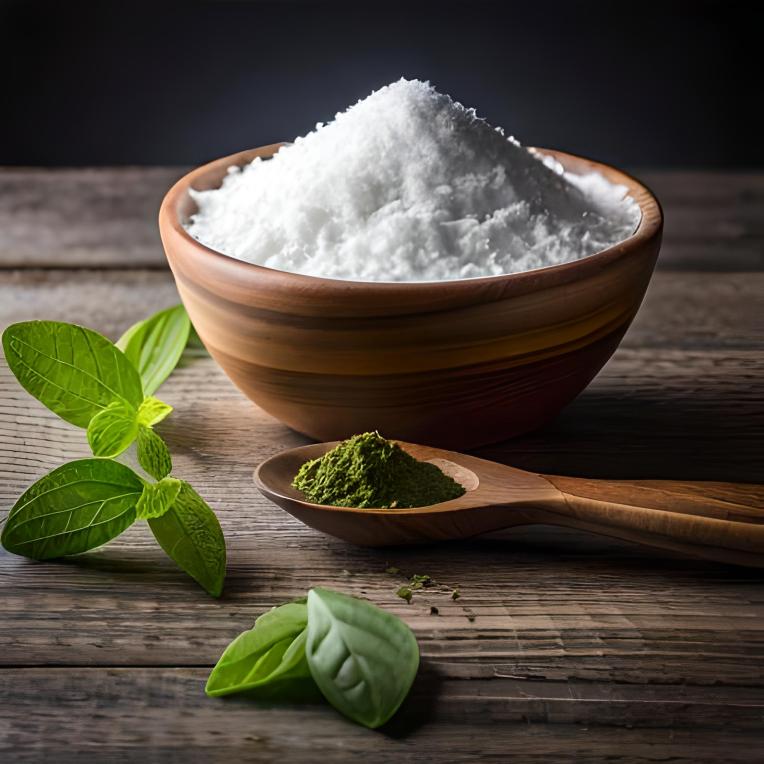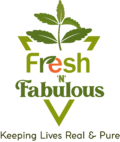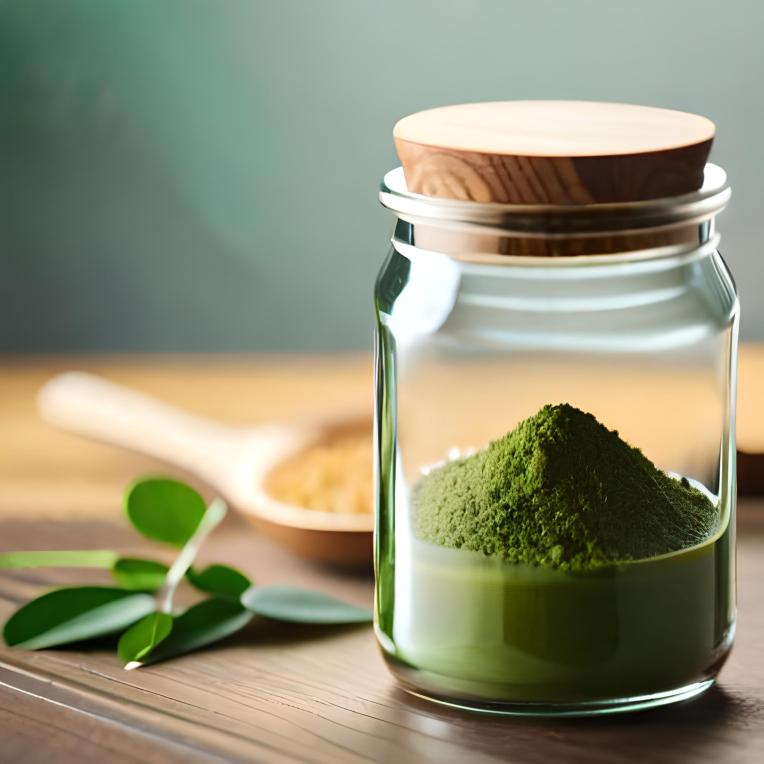Can I Eat Stevia Leaves?-The Ultimate giude
Introduction
Stevia is a natural no-calorie sweetener that has become popular in recent years as an alternative to artificial sweeteners. In this essay, we will explore whether Stevia leaves can be consumed, as well as examine their health benefits, nutritional composition, culinary applications, and potential risks and side effects.
Quick Answer : Yes, you can eat stevia leaves. Consuming Stevia leaves is safe, and they serve as a natural sweetener. However, it’s important to note that stevia leaves have a strong, intense sweetness, so you should use them in moderation to avoid an overpowering taste. The leaves can be dried and crushed into a powder or used fresh in herbal teas or infusions. If you’re unsure about incorporating stevia leaves into your diet, it’s always a good idea to consult with a healthcare professional or nutritionist for personalized advice.
The Stevia Plant

What is the Stevia Plant?
Stevia is a small shrub native to South America that belongs to the sunflower family. It is grown for its sweet-tasting leaves, which contain natural compounds called steviol glycosides.
The Different Varieties of Stevia
There are several different varieties of Stevia, the most commonly used being Stevia rebaudiana. Other varieties include Stevia eupatoria and Stevia serrata.
How is Stevia Grown and Harvested?
Stevia is typically grown as an annual crop and requires warm climates with plenty of sunshine and well-drained soil. It is harvested by hand and the leaves are dried before being processed into a sweetener.
Stevia Leaves
Characteristics of Stevia Leaves
Stevia leaves are small and green with a sweet taste and a slightly bitter aftertaste. They can be consumed fresh or dried and are commonly used as a natural sweetener in cooking and baking.
How to Identify Stevia Leaves
Stevia leaves are small and oblong with smooth edges and a pointed tip. They have a slightly fuzzy texture on both sides and a sweet aroma.
Nutritional Composition of Stevia Leaves
Stevia leaves are rich in antioxidants and contain several vitamins and minerals, including vitamin C, iron, and calcium.
Consumption of Stevia Leaves
Traditionally, Stevia leaves have been used in South America for their medicinal properties, as well as for their sweet taste. They can be consumed raw or cooked and are commonly used in teas, desserts, and other sweet dishes.
Fresh vs. Dried Stevia Leaves
Fresh Stevia leaves have a more intense sweet flavor than dried leaves, but are less convenient to use in cooking. Dried Stevia leaves are easier to store and use, but may have a slightly weaker flavor.
Safety of Eating Stevia Leaves
While Stevia leaves are generally considered safe for consumption, some people may experience side effects such as nausea, bloating, or a mild decrease in blood pressure. It is recommended to consume Stevia leaves in moderation and to seek medical advice if any adverse reactions occur.
Potential Risks and Side Effects of Consuming Stevia Leaves
Consuming large amounts of Stevia leaves or extract may lead to side effects such as gastrointestinal problems, allergic reactions, or a decrease in blood pressure. Individuals with low blood pressure or diabetes should use caution when consuming Stevia.
Recommended Dosages
The recommended daily dosage of Stevia varies depending on the individual’s health needs. It is recommended to start with small amounts and gradually increase as needed, while monitoring for any adverse reactions.
Precautions to Take When Consuming Stevia Leaves
Individuals with medical conditions or who are taking medications should consult with their doctor before consuming Stevia leaves. Pregnant or breastfeeding women should also use caution and speak with their doctor before using Stevia.
Processing Stevia Leaves
Commercial Production of Stevia
Stevia can be commercially produced by extracting the steviol glycosides from the leaves using chemical methods.

Chemical Extraction of Steviol Glycosides
The most common method of extracting steviol glycosides is through a chemical process that involves washing, filtering, and purifying the leaves using solvents.
Health Benefits and Drawbacks of Commercially Processed Stevia
While commercial Stevia products are considered safe for consumption, some studies suggest that the chemical solvents used in the production process may leave traces of toxic chemicals in the final product. Additionally, some commercially processed Stevia products may contain additives or other ingredients that may be harmful to some individuals.
Stevia Leaves and Diabetes
Connection Between Stevia and Diabetes
Stevia has been shown to have a positive effect on blood sugar levels and may be a beneficial alternative to other sweeteners for individuals with diabetes.
Effect of Stevia on Blood Sugar Levels
Stevia has been found to have a minimal impact on blood sugar levels, making it a safe option for individuals with diabetes or other conditions that require blood sugar management.
Recommended Stevia Products for People with Diabetes
Individuals with diabetes should choose Stevia products that do not contain added sugars or artificial sweeteners.
Stevia Leaves and Weight Management
Calorie Intake
Natural Stevia is a calorie-free sweetener, making it a useful tool for individuals who are looking to manage their calorie intake and maintain a healthy weight.
Studies on Stevia and Weight Management
Several studies have found that Stevia may be effective in reducing calorie intake and promoting weight loss.
Role of Stevia in a Healthy Diet
Stevia can be a beneficial addition to a healthy diet, as it can provide sweetness without the added calories or health risks associated with other sweeteners.
Other Health Benefits of Stevia Leaves
Antioxidant Properties of Stevia Leaves
Stevia leaves contain high levels of antioxidants, which can help protect the body against oxidative stress and damage caused by free radicals.
Anti-inflammatory Benefits of Stevia Leaves
Stevia leaves have anti-inflammatory properties, which may help reduce inflammation and promote overall health and wellness.
Potential Role of Stevia Leaves in Cancer Prevention
Some studies suggest that Stevia may have anti-cancer properties and may be effective in preventing or treating certain types of cancer.
Stevia Leaves and Culinary Applications
Culinary Versatility of Stevia Leaves
Stevia leaves can be used in a wide range of culinary applications, from sweetening teas and desserts to flavoring sauces and marinades.
How to Use Stevia Leaves in Cooking and Baking
Stevia leaves can be used in place of sugar or other sweeteners in most recipes. They can be dried, ground into a powder, or brewed into a tea to extract their sweet flavor.
Recipes Using Stevia Leaves
There are many recipes available that use Stevia leaves as a natural sweetener, including cakes, cookies, and other desserts.
Stevia Products vs. Stevia Leaves
Differences Between Stevia Products and Stevia Leaves
Stevia products are commercially-produced sweeteners that contain the extracted steviol glycosides, whereas Stevia leaves are natural, unprocessed leaves that contain the natural sweetening compounds.
Pros and Cons of Using Stevia Products vs. Stevia Leaves
Stevia products are more convenient and easier to use than Stevia leaves, but may contain additional ingredients that some individuals may want to avoid. Stevia leaves, on the other hand, require more preparation but may be a more natural and sustainable option.
Choosing the Right Stevia Product
When choosing a Stevia product, it is important to look for products that are free of added sugars or artificial sweeteners and to choose a product that best suits your individual health needs.
Where to Find Stevia Leaves
Finding Fresh Stevia Leaves
Fresh Stevia leaves can be difficult to find in some areas, but can often be grown at home or purchased from local farmers markets.
Buying Dried Stevia Leaves
Dried Stevia leaves can be found at most health food stores and online retailers.
Local vs. Online Sources for Stevia Leaves
While both local and online sources can be convenient for purchasing Stevia leaves, it is important to choose a reputable supplier and to ensure that the leaves are fresh and of high quality.
Growing Your Own Stevia Plant
Growing Conditions for Stevia
Stevia requires warm temperatures, plenty of sunlight, and well-draining soil. It can be grown in pots or in a garden bed.
How to Plant and Care for a Stevia Plant
Stevia can be grown from seeds or cuttings and requires regular watering and fertilization to thrive. It should be harvested before flowering for the best flavor.
Harvesting and Using Your Own Stevia Leaves
Harvested Stevia leaves can be dried or used fresh in cooking and baking.
Sustainability of Stevia
Environmental Benefits of Stevia Cultivation
Stevia cultivation requires less water, fertilizers, and pesticides than other crops, making it a more sustainable option for agriculture.
Ethical Concerns with Stevia Production
While Stevia cultivation can be an environmentally-friendly option, some ethical concerns have been raised regarding the impact on local communities and workers.
Choosing Sustainable Stevia Products
When purchasing Stevia products, it is important to look for products that are sustainably produced and to support companies that prioritize ethical and sustainable practices.
Conclusion
Stevia leaves can be a natural and healthy alternative to traditional sweeteners, but caution should be taken when consuming them. Individuals should consult their doctor before using Stevia and monitor for any adverse reactions. Additionally, individuals should choose Stevia products that do not contain artificial sweeteners or additives and should support companies that prioritize ethical and sustainable practices.
FAQs
Is Stevia Safe for Children?
Stevia is generally considered safe for consumption by children, but caution should be taken and medical advice should be sought if any adverse reactions occur.
Can Stevia Leaves be Consumed During Pregnancy?
Pregnant or breastfeeding women should use caution when consuming Stevia leaves and should discuss with their doctor before using Stevia.
Is Stevia a Good Alternative for People with a Sweet Tooth?
Stevia can be a beneficial alternative to other sweeteners for individuals who are looking to manage their calorie intake or reduce their sugar consumption.
How Much Stevia Can be Consumed Daily?
The recommended daily dosage of Stevia varies depending on the individual’s health needs. It is recommended to start with small amounts and gradually increase as needed.
Are There Any Medical Conditions That May be Negatively Affected by Consuming Stevia Leaves?
Individuals with low blood pressure or diabetes should use caution when consuming Stevia and should speak with their doctor before using Stevia.


